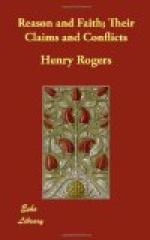that so ineffably rich in genius were these obscure
wretches, that no less than four of them were found
equal to this intellectual achievement; and while each
has told many events, and given many traits which
the others have omitted, that they have all performed
their task in the same unique style of invention and
the same unearthly tone of art; that one and all, while
preserving each his own individuality, has, nevertheless,
attained a certain majestic simplicity of style unlike
any tiring else (not only in any writings of their
own nation, their alleged sacred writings, and infinitely
superior to any thing which their successors, Jews
or Christians, though with the advantage of these models,
could ever attain,) but, unlike any acknowledged human
writings in the world, and possessing the singular
property of being capable of ready transfusion, without
the loss of a thought or a grace, into every language
spoken by man: he must believe that these fabricators
of fiction, in common with the many other contributors
to the New Testament, most insanely added to the difficulty
of their task by delivering the whole in fragments
and in the most various kinds of composition,—in
biography, history, travels, and familiar letters;
incorporating and interfusing with the whole an amazing
number of minute facts, historic allusions, and specific
references to persons, places, and dates, as if for
the very purpose of supplying posterity with the easy
means of detecting their impositions: he must
believe that, in spite of their thus encountering what
Paley calls the ’danger of scattering names
and circumstances in writings where nothing but truth
can preserve consistency,’ they so happy succeeded,
that whole volumes have been employed pointing out
their latent and often most recondite congruities;
many of them lying so deep, and coming out after such
comparison of various passages and collateral lights,
that they could never have answered the purposes of
fraud, even if the most prodigious genius for fraud
had been equal to the fabrication; congruities which,
in fact, were never suspected to exist till they were
expressly elicited by the attacks of Infidelity, and
were evidently never thought of by the writers; he
must believe that they were profoundly sagacious enough
to construct such a fabric of artful harmonies, and
yet such simpletons as, by doing infinitely more than
was necessary, to encounter infinite risks of detection,
to no purpose; sagacious enough to out-do all that
sagacity has ever done, as shown by the effects, and
yet not sagacious enough to be merely specious:
and finally, he must believe that these illiterate
impostors had the art in all their various writings,
which evidently proceed from different minds, to preserve
the same inimitable marks of reality, truth, and nature
in their narrations—the miraculous and the
ordinary alike—and to assume and preserve,
with infinite case, amidst their infinite impostures,
the tone and air of undissembled earnestness.+ ____




